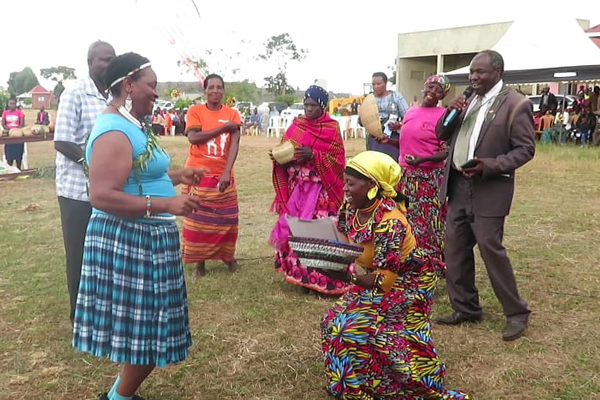Minister, Sebei elders clash over bride price

The State Minister for Gender and Culture, Ms Peace Mutuuzo, arrives in Kween District, Sebei Sub-region for Cultural Day celebrations at the weekend. PHOTO/OLIVIER MUKAAYA
What you need to know:
- While the minister insists that bride price violates the rights of women, elders accuse her of promoting harmful western cultures.
The declaration by the State Minister for Gender and Culture, Ms Peace Mutuuzo, to start a campaign against paying of bride price has attracted mixed reactions, especially from locals and cultural leaders.
Ms Mutuuzo, while giving her remarks during the Cultural Day celebrations at Kween District headquarters, Sebei Sub-region at the weekend, said paying bride price is one of the bad practices that infringe on the rights of women.
“I am starting a campaign against paying dowry (bride price) and I encourage everyone to join me because it works for everyone,” she said.
A bride price custom requires a groom’s family to give a woman’s family cows, gifts, money or any other material goods in exchange for a wife.
Ms Mutuuzo blamed the increasing cases of domestic violence in the country and particularly in Sebei Sub-region on paying off bride price, which she said turns women into bought items and leaves them at the whims of their husband.
“All negative practices, more so bride price and female genital mutilation (FGM) should be kicked out of our societies, not only in Sebei Sub-region but even elsewhere in our communities where such women are subjected to such bad practices,” she said.
Rights groups have for long argued that paying bride price violates Uganda’s constitution, which guarantees women protection from traditions, laws, cultures, and customs that undermine gender equality.
However, Mr John Cherotwo, an elder in Kaproron Sub-county, Kween District, accused the minister of undermining their culture in favour of harmful foreign ones.
“In our culture, a woman is never yours until you have paid dowry [bride price]. It is a certificate of ownership. Therefore, it is a sign that she is your wife and not for another man. These government people want us to live like animals,” he said.
Mr Micheal Chelimo, another elder and a parent of six girls, said the minister should instead launch campaigns against bad Western cultural practices.
“The minister is going to start a war she will not win. Let her concentrate on important issues like fighting poverty,” he said.
However, Ms Rose Chemutai, an FGM activist in Kween District, said bride price leaves women vulnerable in a household.
“It should be fought because it leaves us more vulnerable to physical abuse and it limits our self-determination,” she said.
Ms Mutuuzo also expressed disappointment that cases of FGM in Kween and other districts such as Kapchorwa and Bukwo are rampant despite efforts to stamp it out.
“There is silent increase in FGM and as leaders, we need to step up our efforts because this is dragging us behind,” she said, adding that the Anti-FGM law also needs to be amended.
“The complainant is required to bring the parts of the body, which were cut to present them to the court as evidence, which is very difficult for the victim to get,” she said.
The government banned FGM in 2010. Anybody found guilty of the vice faces a 10-year imprisonment, among other penalties.
Statistics indicate that cases of FGM in Bukwo District had risen from 3 percent in 2019 to around 20 percent in 2021. In other districts of Kween and Kapchorwa, the vice is at 10 percent.
The districts’ leaders have mapped the hotspot sub-counties as Riwo, Chepwasta, Kapsarur, Kortek, and Mutushet. Most of them neighbour Kenya, where FGM is less restricted.
Mr William Chemongi, the Member of Parliament for Kween County in Kween District, said as leaders, they are trying their best to end the bad cultural practices.
He also asked the government to fulfill its promise of setting up a radio station, building a secondary school for girls, with a boarding section and also strengthening security enforcement in the affected sub-counties.
Mr Henry Chesakit Kabwamba, the representative of older persons in Bukwo District, said their daughters rarely get married to men from other regions due to stereotypes associated with FGM.
He, however, said social norms and strong peer pressure limit girls’ ability to make free and independent choices against FGM.
Mr Sam Charles Chebet, the chairperson of Kaproron Sub-county in Kween District, blamed the rampant vice on the traditional birth attendants, who he said cut the women when they go for antenatal care.
“It is becoming difficult to fight the FGM. The percentage of FGM cases had gone down but it is now on the rise,” Mr Chebet said.





